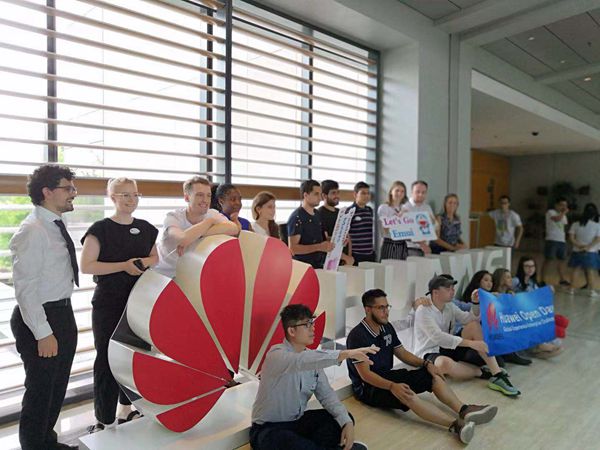




- BRNN
- BRI News
- BRNN News
- Database
Official Documents Polices and Regulations
Inter-government Documents International Cooperation BRI Countries
Business Guide Economic Data BRI Data
Trade
Investment Projects Latest projects
Cases - Content Pool

International students visit a research center of Huawei in Shanghai during their study in China.[Photo provided to China Daily]
An education alliance is bringing more students from countries and regions involved in the Belt and Road Initiative to study in China, with almost 200 new places being created this year for students from Mexico alone.
Last year, 37 Mexican students were jointly selected to join master's degree programs in China by the Mexican government and the B&R University-Enterprise Alliance for Talent Development. This year, the number jumped to 230, executive secretary-general Zhou Yong said at the 2019 China-ASEAN Education Cooperation Week, which ran from July 22 to 26 in Guian New Area, Guizhou province.
"About 60 Chinese companies, including Huawei and Didi, have set up offices in Mexico. They are in need of talent who can speak Chinese. Our alliance coincides with their development needs," Zhou says.
Established in July 2017 by the China Campus Network, the China-ASEAN Education and Training Alliance and several high-profile Chinese enterprises, the alliance aims to promote cooperation on talent training between domestic universities, governments involved in the Belt and Road Initiative and Chinese companies operating overseas.
Setting up talent training programs with member universities and nine Mexican state governments, the alliance held joint exams in July to select outstanding candidates.
Of all the Latin American countries, Mexico has the most frequent exchanges with China in education, culture, sports and tourism. It cooperates with China in over 10 fields, including e-commerce, tourism management, engineering and big data.
"Since our alliance helps bilateral trade and investment, we won strong support from the Mexican government," Zhou says.
The Mexican government covers the first year's tuition fee, accommodation expenses and basic living expenses for students while the other three years' expenses are shared by the universities and the Mexican government. Industry partners offer internships and employment opportunities.

International students visit a research center of Huawei in Shanghai during their study in China.[Photo provided to China Daily]
The alliance now has 28 member universities and offices in 12 countries, including Russia, Mexico and Malaysia, and maintains ties with Chinese companies investing in those countries.
Liu Baoli, executive secretary-general of the China-ASEAN Education Cooperation Week, says the alliance has adopted a system of "joint selection, joint funding and joint training" to create a new model for studying abroad in China.
As an initiator of the China-ASEAN Education Cooperation Week and an early member of the alliance, Guizhou University has forged relationships with universities in ASEAN countries via the platform.
This year's event saw members of overseas government institutions, domestic universities and Chinese companies work together to develop expertise and boost training and employment.
Nine Mexican state governments signed cooperation agreements with universities of the China Campus Network, as did Huawei. Additionally, two CCN centers, located in Russia and Uzbekistan, were officially launched at the event.
Zhou says the alliance will continue to promote "customized talent training models with government participation and university-enterprise cooperation" and it hopes to establish programs with Mongolia, Cambodia and several other countries.
"We will continue to serve local development, promote trade and enhance the global reputation of Chinese universities," Zhou adds.

Tel:86-10-65368972, 86-10-65369967